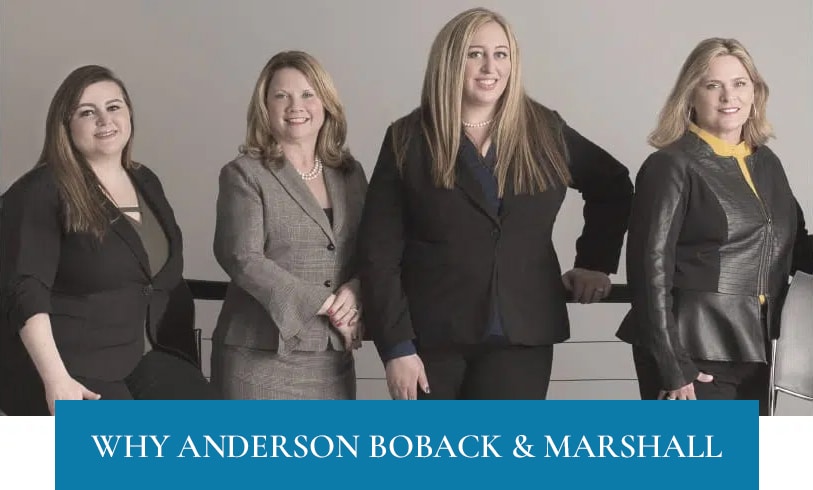

Guides
WHAT TO EXPECT IN FAMILY LAW COURT
Long before you get to court, there are a number of steps your case will take.
WHAT TO EXPECT IN A FAMILY LAW TRIAL
The rules are different in a civil case vs. a criminal case. Domestic relations cases for the most part applies civil laws, but there are times when your case could turn into a criminal matter. Not following a court order for instance can lead to contempt, which could lead to jail. Which is how your civil case just turned into a criminal case. But for the most part, your case will occur using the civil system.
When you are a client of Anderson Boback & Marshall we meet with you on a regular basis to determine what your needs are and how we’ll best accomplish what you need. Sometimes we can negotiate with the other side and get an agreement, and sometimes we cannot. Most cases end up in a settlement whereby the parties sign an agreement that resolves all of the issues, including division of assets and how time will be spent with the children. These settlement agreements can be done by lawyer-led negotiations before or after filing, at mediation, at an impromptu settlement conference, or even on the eve of trial.
If there is no agreement, that is when we start preparing your case for court. Court can be unpredictable however, and sometimes the judge rules in your favor and sometimes the judge goes a totally different way. Settling the case between you and the other side is generally the best course since you know the outcome, but when the other side is unreasonable, sometimes you have no choice but to take the case to trial.
What exactly does it mean when we say “take your case to trial?” A case that will be litigated before the judge has to be done in a certain way. There are certain mandatory steps that need to be taken. Probably the most important step is determining exactly what your issues are and making sure that there is enough evidence and witnesses to support your position before the Court. Failure to bring the issue to the court can result in no ruling on that issue, which can be very frustrating for the client.
Trials are similar to what you see on TV: each attorney will present an opening statement to the judge explaining what they anticipate the evidence will show. Witnesses will be called by both sides and cross-examined by the other side. Evidence will be presented to the court to help both sides articulate their view of their case. The judge may ask some questions of both parties. At the end, both attorneys will give closing statements to the judge that will explain the facts as presented, apply them to the law, and argue for a particular outcome.
At the end of the trial, the judge will decide the outcome. In some cases, the judge is able to make a ruling then and there on all of the issues. More often, however, the judge needs to go back and review all the evidence and will make a ruling at a later time.
It’s not uncommon for a trial to be finished and to wait for weeks (or sometimes even months) for the final decision from the judge.
After the judge rules, you still have some options. You can ask the judge to reconsider the ruling if you believe there was an error made, or you can ask the Appellate Court to review the trial court’s ruling. Judges have specific requirements about how they weigh evidence and make determinations when you go in front of them for a trial.
For example, when it comes to dividing assets and debts, the judge needs to see competent evidence that explains what the asset is and its corresponding value. Sometimes people argue about whether an asset is an asset that even needs dividing. For instance, in a divorce trial, if your mother gave you an asset through her Will, you might be able to call that your “non-marital property” and it would automatically be yours. But if you took that asset and deposited it into a joint account with your spouse, that might change its designation. You’ll discuss these facts with your lawyer to come up with how you’ll characterize this asset at a trial.
If valuation is an issue, your lawyer will typically tell you what is needed. Do you need an appraisal? The value of the asset is typically what someone will pay for it. If your asset has value, even if it is a bobble head collection, then you’ll need some facts to support the value. If you sold your asset, what would someone pay for it? That is a good barometer for the court.
Once an asset is valued, then you have to divide it. Should you get ½ of the value or more?
Each issue that will presented to the court has its own set of “proofs.” Each issue might need different documents to prove your theory to the court and might need its own set of witnesses.
Consider a contested children’s custody case. When we’re trying to figure out the relationship between the children and the mother and father, the sheer amount of evidence that can be presented to help explain a good custody arrangement can be daunting. Text messages, emails, pictures, school records, doctor’s records, etc. —all over the course of many months or years.
WHAT TYPE OF WORK IS NEEDED BEFORE YOU GET TO TRIAL?
Below is a list of what we need to have accomplished before we go into court the day of the trial.
- Financial Affidavit/Disclosure Statement: The first document you’ll ever prepare in your case will be called a financial affidavit, or Disclosure Statement. This document lets the court know your income and assets, and any liabilities you have. The second part of the document lists all of your assets. It is very important that this document is accurate and the first time you prepare it, it will take a lot of preparation. You’ll need to know yearly numbers for expenses such as your auto and home insurance, so preparing this document will initially take you a lot of time. In the event anything on this document changes, you’ll need to update it and especially just before the trial an update will be required.
- Pleadings Filed: You have to give the court and the opposing party notice about what issues need to be resolved. If you need child support, a Petition for Child Support will be filed on your behalf. It is important to discuss your needs with your attorney so that the appropriate petition can be filed on your behalf.
- Discovery: After the financial affidavits are exchanged, most cases will start the discovery phase of the case. You’ll answer specific questions, called interrogatories and produce three years worth of bank statements, tax returns and credit card statements, among other documents. You’ll want to pay attention to the pleadings that have been filed by the other side, since some of the discovery you answer may be in defense to what the other side is requesting from you. After all discovery is exchanged, it is time to conduct the depositions of the witnesses.
- Depositions: Depositions are conducted of the witnesses that will testify at trial. The deposition is taken under oath, and all parties to the litigation can be present, along with a court reporter. The typical time allowed for each person’s deposition is three hours, although they may finish in less time, and with the court’s permission, can be longer. Your attorney will prepare you for your deposition when it is close in time to the date.
- Exhibits: Once all the pleadings have been filed and all the discovery and depositions taken, it is time to set your case for trial. A conference with your attorney will be necessary to discuss which exhibits you’ll want the court to review. If you are trying to prove your income, you might want your tax returns to be seen by the court. A discussion of the pleadings that have been filed will assist you and your lawyer about which document will need to be marked as an exhibit.
- Pretrial: Most judges will require a pretrial in your case. Some issues are easier than others and the court will want an opportunity to try and resolve the issues without going to trial. It is an informal process that the court typically has with just the attorneys. The judge will hear the issues and opine on the issues presented. If each party can agree to the judge’s recommendation to resolve the case, then a trial becomes unnecessary. A pretrial can save the parties a lot of money and if you can reach your own settlement, it is generally easier to accept than having the judge rule, since you never know the outcome of a trial.
YOUR DAY IN COURT: THE TRIAL
You will be required to go through security when you get to the courthouse. Cook County courts allow you to bring in a camera phone, but many other courts do not. DuPage and Will County for example, do not allow you to come into the courthouse with camera phones. Please check with our office before you appear in court so that you are not delayed at security. You will go through an X-ray machine, so do not bring in any type of weapon, which of course includes guns, but also knives and pepper sprays. They are not allowed. The court will not like you bringing any type of food or drink into court, and you should have your phone silenced and put away while you are in the courtroom. There will be many cases up in court on the same day you are there. Although you are likely going to wait awhile for your case to be called, you do need to be there on time. If your court date is at 9:00 a.m., you need to be there at 9:00 a.m., and not any time later. When you arrive, you should go to the front of the courtroom and let the court’s clerk know you are there. If your attorney arrived before you, that attorney will have already checked in, but it is a good practice to always check in and wait in the courtroom for your attorney. If your case is called, and no attorney is yet present, just stand up and let the court know you are there. Sometimes your attorney will have more than one case up that day. If you are planning on being in court, make sure your attorney knows that before the court day. Your attorney then can tell you if they’ve already arranged for your case to be heard a little later in the day due to scheduling conflicts. When your case is called, you will come up and stand before the judge. Once you approach the Judge, you will likely have to take an oath stating that your testimony will be truthful. Always be respectful to the court and speak up so the Judge can hear you. Answer any questions truthfully and make eye contact with the court. Your demeanor is important and you do not want to anger the Judge in any way. If you are before the Court and so is the person with whom you are litigating against, please know that you cannot banter back and forth with that person when you are before the Court. Court tv has led people to believe that yelling or fighting with your opponent in front of the Judge is an acceptable practice, but IT IS NOT. Your only comments can be made directly to the Court. Most people don’t need guidance in this area, but you need to consider what you wear into the courtroom. You don’t need to wear a suit, but you also don’t want to look like you just got off the beach either. Don’t wear shorts and flip flops. Don’t wear t-shirts with offensive language on them or illegal drug symbols. Act like you are going to church. Or are going out for a nice dinner in a fancy restaurant. How you look and sound in court could influence your case, so think about that when planning what you’ll wear that day. Many people feel the need to say something to the Court, even though no question is asked of them. You need to resist this urge. Your lawyer will communicate what the Court needs, and oftentimes, you do not understand how your comments can hurt your case. Before you make any comments to the court, run those comments first past your attorney. Your attorney will let you know if you should say them, or stand there silently. Your lawyer is looking out for your best interests, so you need to follow their lead.

To book a confidential consultation, please
call (312) 606-7241 or visit our website at illinoislawforyou.com to request an appointment.
Was this information helpful?
YesNo
Why Choose
Anderson Boback & Marshall?










Schedule a Discreet Consultation Today!
APPOINTMENTS AVAILABLE AT OUR TWO CONVENIENT LOCATIONS
Chicago Downtown Office
20 N. Clark Street, Suite 3300 Chicago, IL 60602
Northbrook, IL Office
5 Revere Drive, Suite 200 Northbrook, IL 60062
Firm Overview
Anderson Boback & Marshall
Anderson Boback & Marshall is a highly-respected, experienced family law firm, skilled in negotiation and litigation for divorce and other family law issues. With multiple offices in NorthBrook and Chicago Downtown, we make it easy for you to book an appointment in a location near you. Our family and divorce lawyers serve families in Cook County, Lake County, Will County, and DuPage County. Call Now 312-715-0870





